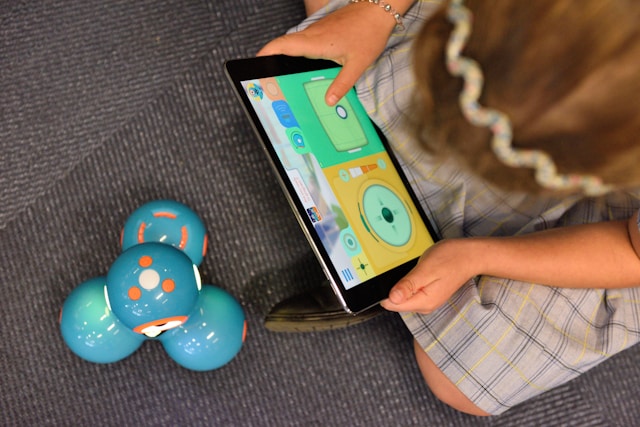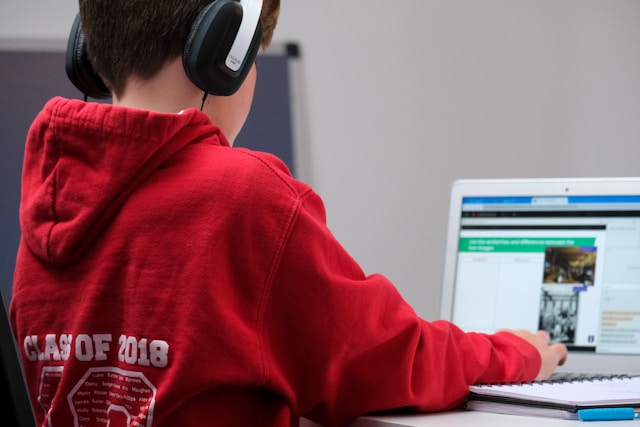
In today’s fast-paced digital world, parents face a unique challenge: how to guide their children’s technological development without falling into the trap of ‘helicopter parenting’.
This term, often associated with parents who hover over their children, closely monitoring every aspect of their lives, takes on new dimensions when it comes to technology.
With smartphones, tablets, and the internet becoming integral parts of childhood, it’s crucial for parents to strike a balance between providing guidance and fostering independence.
This article explores how parents can embrace technology as a tool for their children’s growth while avoiding the pitfalls of overprotectiveness.
The term “helicopter parenting” has become relevant in the digital age. But what exactly does it mean?
Imagine a helicopter hovering overhead, constantly watching and swooping in at the slightest hint of trouble.
Helicopter parents behave similarly, closely monitoring their children’s activities, especially regarding technology.
Dr. Haim Ginott first coined the term helicopter parenting in his 1969 book Between Parent and Teenager. It describes parents who are overly involved in their children’s lives.
While every parent wants the best for their child, helicopter parenting involves involvement that can hinder their ability to develop independence and problem-solving skills.
With the rise of smartphones, tablets, and the internet, the scope of helicopter parenting has expanded.
Parents might feel the need to constantly check their children’s online activities, limit screen time excessively, or control their digital interactions. While these actions stem from a place of concern, they can lead to unintended consequences that parents need to be aware of.

Parenting in today’s tech-driven world can be a rollercoaster of emotions. Many parents feel a natural anxiety about their children’s well-being, but helicopter parents take this to the next level.
They are overly anxious even when their kids are safe, constantly seeking to shield them from harm, failure, and disappointment.
This results in close monitoring and controlling behavior to ease their worries. These parents often have a strong, sometimes overwhelming, desire for their children to succeed.
– Overcompensating for Their Childhoods: Some helicopter parents are driven by past experiences. For instance, if they felt emotionally neglected as children, they might overcompensate by being overly involved in their own children’s lives, trying to fill the gaps they once felt.
– Societal and Social Pressure: Friends, family, cultural norms, and social media all play a role in amplifying a helicopter parent’s anxiety. The constant pressure to succeed can lead these parents to believe that their intrusive actions are necessary, pushing them to micromanage every aspect of their children’s lives.
– Uncontrollable Anxiety: Many helicopter parents deal with relentless anxiety. They find it difficult to relax, fearing something might go wrong. Whether it’s worrying about their child getting hurt or falling ill, their anxiety drives them to be constantly vigilant and involved.
– Fear of the Unknown: Life’s unpredictable nature can be terrifying. Helicopter parents often fear the worst—like their child being kidnapped or suffering a severe injury when out of sight. They also worry about academic failure or other setbacks, leading them to hover closely to prevent potential issues.
– Desire to Help and Intervene: These parents strongly need to help and guide their children in every task and relationship. They direct their children on how to do things according to their perspectives, often without considering their children’s feelings about such invasive behaviors.
To a certain extent, it might, particularly for the parents.
Although helicopter parenting is a debated modern approach, research indicates that parents who are deeply engaged in their children’s lives often experience increased happiness and a greater sense of purpose.
However, the advantages of helicopter parenting might not apply to the children themselves.
While some parents closely oversee their children to give them a leg up, other studies suggest that this constant involvement can actually make it more difficult for some kids to succeed in school and later in life.
Helicopter parenting often refers to caregivers who assist high school or college-aged students with tasks they can handle independently, such as contacting a professor about grades, organizing class schedules, or overseeing exercise routines. However, this parenting style can be seen at any stage of a child’s life.
“In toddlerhood, a helicopter parent might constantly hover over the child, always engaging in play and directing their behavior, leaving no room for independent time,” explains Dr. Dunnewold.
During elementary school, helicopter parents might strive to secure a specific teacher or coach for their child, choose their friends and activities, or provide excessive help with homework and school projects.

While the term “helicopter parenting” often carries a negative connotation, there are ways to be involved in your child’s life in a supportive and effective manner. Here are some tips for practicing helicopter parenting in a way that benefits both you and your child:
Establish clear boundaries between involvement and overreach. Ensure your child understands that while you are there to support them, they must also take responsibility for their own decisions and actions.
Discuss and agree on specific areas where you will be involved and where they will have more Independence.
Foster an environment where open communication is encouraged. Regularly check in with your child about their feelings, concerns, and experiences, and be a good listener.
Use conversations as opportunities to guide rather than to dictate, allowing your child to express their thoughts and make their own choices.
Rather than solving every problem for your child, offer support and guidance to help them find solutions. This approach allows them to build problem-solving skills and confidence.
When your child faces challenges, ask questions that lead them to think through potential solutions rather than providing the answer immediately.
Please encourage your child to take on responsibilities and make their own decisions. This will foster independence and help them develop crucial life skills.
Start with small tasks and gradually increase their responsibilities as they show readiness and capability.
Model the behaviors you want to see in your child. Show them how to manage stress, handle problems, and balance various aspects of life.
Demonstrate healthy technology use and time management in your own life, and discuss these habits with your child.
Those are some things about helicopter parenting that you can know, hopefully with this article can help you. You can learn more about parenting tips and tricks at Kids.tech right now!


